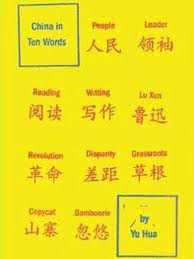I had wished "happy birthday" to a cousin of mine on Facebook.
I noticed that others had posted the same on his "wall".
But the birthday boy never thanked anybody back till very recently.
He said he had been in China and he wasn't able to access Facebook because "Facebook is banned in China."
The tone in which my cousin mentioned the fact of banning was normal, as though he were reporting the absence of bananas in Alaska.
My cousin's nonchalance in this matter didn't perturb me in and of itself. After all Indians are phlegmatic where the question of human rights violation, or threats to autonomy and freedom--abstract stuff like that--is concerned. But threaten the urban middle class with a ban on malls, then Indians would be up in arms.
What perturbed me was what the cousin said in conjunction with the "ban". He said that "China is a magnificent country."
How could a member of thriving democracy (then again, India is a poster child for democracy without being really democratic in any meaningful sense of the term) commit the sin of such a blatant oxymoron?
"Facebook is banned in China. China is a magnificent country." The utterance has two separate parts not joined by a "but" or "however" to highlight a contradiction. It's as though the observer were looking at two different parts in the same thing and is deaf and blind to the contradiction.
I'm not saying that my cousin is politically obtuse; it's just that he is being characteristically Indian in his observation of China. He notices the presence of Beijing's beauty--the gorgeous malls, the clean roads, the overall architectural splendor, cleanliness and efficiency. In this aesthetic and infrastructural sense, China is the obverse of India.
The beauty of China has obviously mesmerized the Indian visitor, as it had mesmerized the American visitors back in the day of the 2007 Beijing Olympics.
But the absence of freedom did not register as a significant lacunae in China's apparent perfection. He didn't express shock at the fact that Facebook is banned in China. Nay, he overrode the concern for freedom and democracy and a lack of both in China as frivolous and went on to tub thump about the nation's "magnificence."
I believe that Indians in general are comfortable living with violation. There are low and high level violations of all kinds everyday in India. Take freedom or rights away from Indians--they won't mind is my guess. But take the guarantee of a monthly wage away from them, they'll faint in horror. Trade security (of a monetary kind) with freedom and Indians will be un-protesting to the hilt.
In light of the recent power blackouts in large parts of India I noticed a queer sentiment among my Indian brethren (and sisterhood) on Facebook. Many were "fed up" with living under Indian governance, marked as it is by inefficiency and grave corruption. Some yearned for a recolonization of India. The argument was that Indians fared "better" under the British Raj.
Perhaps Indians don't quite care for freedom-"shreedom" and such non-material garbage.
What do they care for? I don't know; maybe a flat far removed from the stench and squalor of everyday Indian reality? To attain that they might be willing to forego freedom and many rights.
As my favorite fictional servant Balram Halwai had noted in
The White Tiger, Indians are born to be ruled and if ever they are in the market looking for an invader/ruler, China would be the nation of choice.





